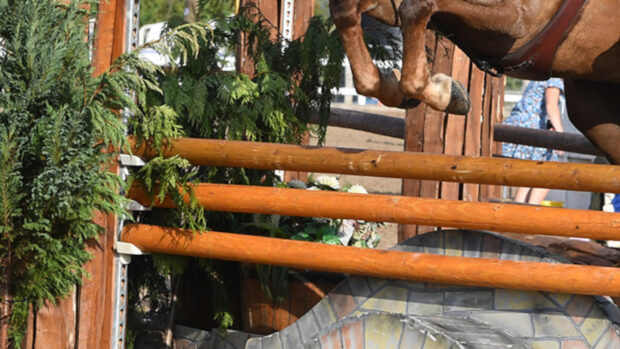British Eventing (BE) will bring in a major whip rule change next season, and a horse welfare panel will be formed to make recommendations that could come into effect from 2024.
The news broke at the organisation’s 2022 AGM held virtually last night (8 December).
BE chief executive Helen West told the meeting that from 2023, BE “will now insist” on only padded whips being carried for the jumping phases. This follows British racing, which has used padded whips only since 2004 in jump racing and 2007 on the Flat, and British Showjumping (BS), which changed its rules in 2020.
H&H has contacted BE to ask for further details about the rule, including any specific requirements that padded whips must meet.
Ms West added that the sport’s horse welfare panel will be “looking at a range of issues in 2023 and making recommendations for implementation in 2024”.
“Horse welfare is something that BE taken extremely seriously,” said Ms West, detailing many ways BE focuses on this area, from research to ground care, standards of emergency care providers and more.
“Although the horse-human partnership is an ancient one, for it to thrive long-term, equestrianism needs to ensure it continues to have the approval and acceptance of wider society.
“When an activity does have society’s approval or acceptance. It’s said to have a social licence to operate. The equestrian world needs to maintain and strengthen its social licence for it to have a future.
“This means the welfare of the horse must be put first – and seen to be put first all of the time — and it’s the responsibility of everyone who is involved with horses to demonstrate this.”
After the AGM, Eventing Riders Association president Bruce Haskell told H&H the padded whip decision was initiated by Ms West, and discussed and approved this year as “the right move” to step in line with BS.
Explaining how the welfare panel came about, he added: “As the evolution of the influence of social licence has come across this year, we’ve had a rider-led initiative where riders have asked BE for the formation of a welfare and ethics working group.”
That panel will include riders from grassroots to elite level, ensuring they are directly involved in helping make “best practice” changes. The priority is, as always, to have the horse front and centre of any decisions and that it is crystal clear when talking about “social licence”, that this is about the horse first and foremost.
“We believe that if we are involved in the conversation early, and we are part of the process of cultural change, we can then influence international eventing, rather than have change dictated to us by people who don’t understand the sport,” said Mr Haskell.
“This cannot be a marketing exercise. This has to be a complete examination of our best practice with the horse at the central point.”
He added that the intention is to drive a cultural change within eventing, which does not just focus on the whip. Rather it starts a bigger change that will influence training and development of horses and riders for generations to come.
“It has to be a process,” he said. “An internal review of our best practices is better than an external agency enforcing that on us.”
‘Not a simple beast’
The final 2023 fixtures calendar will be released on Monday (12 December), following a revamp of the allocation process (news, 27 October).
“The fixtures are not a simple beast,” said Ms West, adding that BE has looked at the geographic spread and listened to member feedback. “We are acutely aware that some areas have lost BE events. Adding new fixtures to the calendar is a delicate balance and requires us to work collaboratively with existing organisers.”
This 2023 affiliation agreement adds time restrictions to when BE organisers can run unaffiliated events (news, 3 November) – and it transpires that any organiser wishing to host international classes may not run fully fledged unaffiliated fixtures. Instead of unaffiliated, they are being asked to run “Go BE” fixtures instead. These fall under the BE umbrella, providing on-the-day scoring, and rosettes and prizes in kind can be offered, but results do not go on the official BE record, there is no prize money and they cannot count towards minimum eligibility requirements. But the possibility of expanding Go BE in future was hinted at.
“We have a big challenge obviously from [the] unaffiliated [market],” said BE chairman Mark Sartori.
“As far as I’m concerned, we are the national governing body and it’s our job as the board to ensure the future of the sport in the country and the right governance. We’ve made a lot of mistakes in the past. But the crown jewels of our events are [the] international. So the board has decided as we move forward that if you’d like to run the crown jewels, you need to be supporting BE.
“For all international events, if they traditionally run unaffiliated, we’re asking them to run [those] as Go BE. Interestingly, on that point, we’ve had more organisers [and] more events apply than ever before, and lots of unaffiliated events are coming back to the BE fold.
“There’s a balance here of looking after and supporting all our organisers, but also moving the sport forward. It’s our duty to look after the national governing body, but work with our organisers and offer them an alternative to unaffiliated.”
‘Reduce costs’
Following the millions spent on IT, BE is moving away from its bespoke software to using third-party systems where possible. BE director Di Brunsden took the meeting through the five-phase plan to “simplify” the organisation’s IT.
“It is too fragile and we have too many technologies involved,” she said.
“Obviously we are also trying to reduce costs. Because of the complexity, [the current IT system] is expensive to support and maintain.
“We are going to remove as much of the bespoke software that has been built wherever possible. BE is not a software company. It’s a national governing body. It is not big enough to support the amount of bespoke software that we actually have at the moment.”
You might also be interested in:

Major change to whip rules made to promote welfare

New whip rules to roll out in early 2023

Subscribe to Horse & Hound magazine today – and enjoy unlimited website access all year round
Horse & Hound magazine, out every Thursday, is packed with all the latest news and reports, as well as interviews, specials, nostalgia, vet and training advice. Find how you can enjoy the magazine delivered to your door every week, plus options to upgrade your subscription to access our online service that brings you breaking news and reports as well as other benefits.




